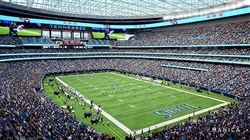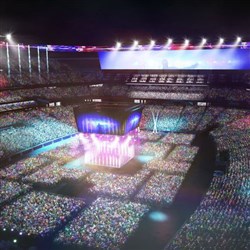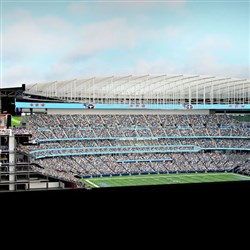VOL. 46 | NO. 45 | Friday, November 11, 2022
State sees new stadium as money maker
By Tom Wood
Two point one BILLION dollars. It’s a staggering number … a $2.1 followed by nine zeros. That’s the proposed agreement between Mayor John Cooper and the Titans to build a 17,000-square-foot, 60,000-seat enclosed stadium on the East Bank of the Cumberland River that – if approved by both the Metro Sports Authority and Metro Council next spring – would be the largest public/private project in Nashville history.
And the Nashville-based Sycamore Institute – an independent, nonpartisan public research center based in Nashville – concludes it’s also about the same amount of money that state and local governments have either committed or proposed to help fund major stadium projects across the state of Tennessee.
In a June report titled “Stadium Subsidies in Tennessee,” the report showed how $1.8 billion had been committed to stadium projects for:
• The new multipurpose Nashville stadium ($1.5 billion)
• A new Tennessee Smokies baseball project in downtown Knoxville ($55 million)
• A new Chattanooga Lookouts downtown facility ($44 million)
• Bridgestone Arena to the tune of $200 million through 2049
• A minor league soccer stadium in Chattanooga ($5 million)
• $17 million for racetracks in Nashville and elsewhere
And that was before Memphis officials in October asked the state for $350 million to upgrade the Liberty Bowl, FedEx Forum and other facilities – pushing the total public funding request at well more than $2 billion since 2021.
As city and county leaders across the state debate their proposed projects, one must wonder if taxpayer dollars should be used to fund these projects.

An enclosed stadium would allow year-round events, promoters argue.
-- Renderings Provided By Tennessee TitansBrian Straessle, interim director of The Sycamore Institute, and deputy director Mandy Pellegrin say economists are in agreement that publicly funded pro sports stadiums don’t often generate enough new economic activity to cover the public subsidies they receive.
“You have a finite number of revenue sources that you can use realistically and politically. And when you use these revenue sources for one thing, you can’t use them for another,” says Pellegrin, author of the report.
“So when you’re trying to think through all those economic calculations, you have to think of all the other investments that you can make with those same public dollars.
Adds Straessle: “A lot of the studies show that the stadiums themselves have negligible benefit to the surrounding area. With that said, sports can have an impact on the economy.”
‘I consider it an investment’
Rather than subsidies, House Speaker Cameron Sexton, R-Crossville, calls them investments that are good for the state’s thriving economy, pointing to a new Titans stadium as an example. The state’s $500 million is earmarked to the project only if it is an enclosed facility.
“I don’t consider it subsidizing. I consider it an investment, especially if you’re looking at (Nissan Stadium),” Sexton says. “That venue is used less than five months a year, I would say – and I think that would be very generous – that’s an outdoor facility that’s run down.

Stadium configured for a concert with the stage in the end zone
“Moving it to an indoor facility will allow us to use it year-round, which would be able to host more things than we currently host right now.
“You’d have the opportunity to host WWE’s biggest event, WrestleMania. You’d have the opportunity to host the Super Bowl. You’d have the ability to host college championship games for basketball and football and concerts and conferences that couldn’t be held at Bridgestone because they need to be inside.
“So the Titans stadium … I don’t see that as a subsidy; I see that as an investment. And a development that will pay itself back in time.”
‘Whole lot of questions’
Metro Council member Freddie O’Connell, thus far the only Council member to have announced plans to run for mayor in 2023, says he is carefully listening to and watching the figures being scrutinized by lawmakers.
Notable concerns, says O’Connell, whose district includes much of downtown west and south of the Cumberland River, include parking and transportation construction “with a potential for $500 million in additional infrastructure.
“This stuff is adding up to quite a bit of public investment,” he says. “I’m still looking for enough information to try to help make a determination about whether this is in fact a good investment.

Stadium configured for a concert with the stage at midfield
“I do share the goal of wanting to renegotiate away some of that existing liability, but with the information I have in hand, it’s hard for me to yet determine for the city as a whole – as a public investment – that this is obviously a good investment for the city, and obviously it’s good because it produces more net revenue and removes this other liability.
“Right now, what I see is a transfer of liability – and then a whole lot of questions. You know, that’s where we are right now to me is we’re looking for answers to those questions.”
Nissan renovations costs
That commitment by the city was the subject of Monday night’s East Bank Stadium Committee meeting in Council chambers, where Brentwood-based Venue Solutions Group presented the facility condition analysis report the group made at the request of the Mayor’s Office.
The nearly two-hour meeting featured multiple Council members asking questions of VSG managing partner Russ Simons, a former general manager of Bridgestone Arena with nearly 30 years in the sports facility industry, whose overview of the 99-page report placed the total costs of suggested renovations at Nissan Stadium at between $1.75 billion and $1.95 billion.
The analysis didn’t present an argument for “renovation versus replacement,” but rather took a look at the costs associated with keeping the stadium competitive with other NFL venues of similar age through to the end of the city’s existing lease agreement, which runs through 2039.
Several Council members expressed frustration with VSG’s methodology, including:
• Focusing their recommendations on a similar set of recent renovations to Miami’s Hard Rock Stadium
• Lack of specificity about what constitutes “first-class” amenities within an NFL venue – the linchpin phrase in the current lease driving the debate over the potential new stadium

Cross section of stadium
• And, most heatedly, VSG basing its recommendations primarily on a set of proposed renovations prepared by architecture and design firms Gensler and Hastings, which the members said they had not yet seen.
District 15 Council member Jeff Syracuse, who is running for a Metro Council at-large seat in 2023, says the project needs to find a balance between not only what’s good for the visionary East Bank redevelopment over the next decade but also what’s good for other parts of the city – especially when it comes to “our existing challenges – be it stormwater, sustainability, resiliency (or) affordable housing.
“I don’t want the East Bank to have to be the development that helps pay for the stadium. Any development that we do in this city has to benefit all the taxpayers across the county.
“It’s a balance between ensuring that good development drives investment in services in our departments that benefits the entire county. … We have to make sure that as we build out smaller pieces of transit infrastructure that we are keeping the picture in mind and that it is going to also benefit everybody throughout the county.”
Pro-business spending
In a number of reports issued the last few months by CNBC and others, Tennessee ranks among the top 10 states for doing business. Different metrics were used in each report, so Tennessee’s ranking varies. But the consistent point is that Tennessee is a pro-business state.
“We have a state that’s really performing well, and our economy is excellent in Tennessee,” Sexton says. “We have an opportunity to do things that we’ve never seen before in our state.
“There’s a lot of opportunities, and our state is doing very well. We’re not going to spend money foolishly, but we are going to make sure that if we do it, that it makes sense and there’s a return on it and that it is beneficial.”
Sexton points out that Tennessee benefits from being a sales tax-based state.
“Our income is derived from people spending their money. And whether that’s people from Tennessee or outside Tennessee, that’s how we budget.
“The bulk of our revenue comes from sales tax. Some of these projects help enhance the local communities’ ability to attract more visitors, more people and collect and have people spend money – which is at their own discretion,” he says.
“We’re not taxing income; we’re taxing spending – which is a better use of collecting taxes, I think, because it’s up to you if you want to spend your money. And so, some of these projects allow these local communities to actually provide more attractions for individuals who come into our state or for those who are local.”
O’Connell counters that the money flowing into state coffers doesn’t always boost Nashville’s economy.
“If I were making a wish list of things that I wish the state of Tennessee would offer us the opportunity to spend $500 million on, there’s a pretty good list of things that I feel like I’d love to have the state helping us invest in. So, again, we’ve just got to make that determination,” he says.